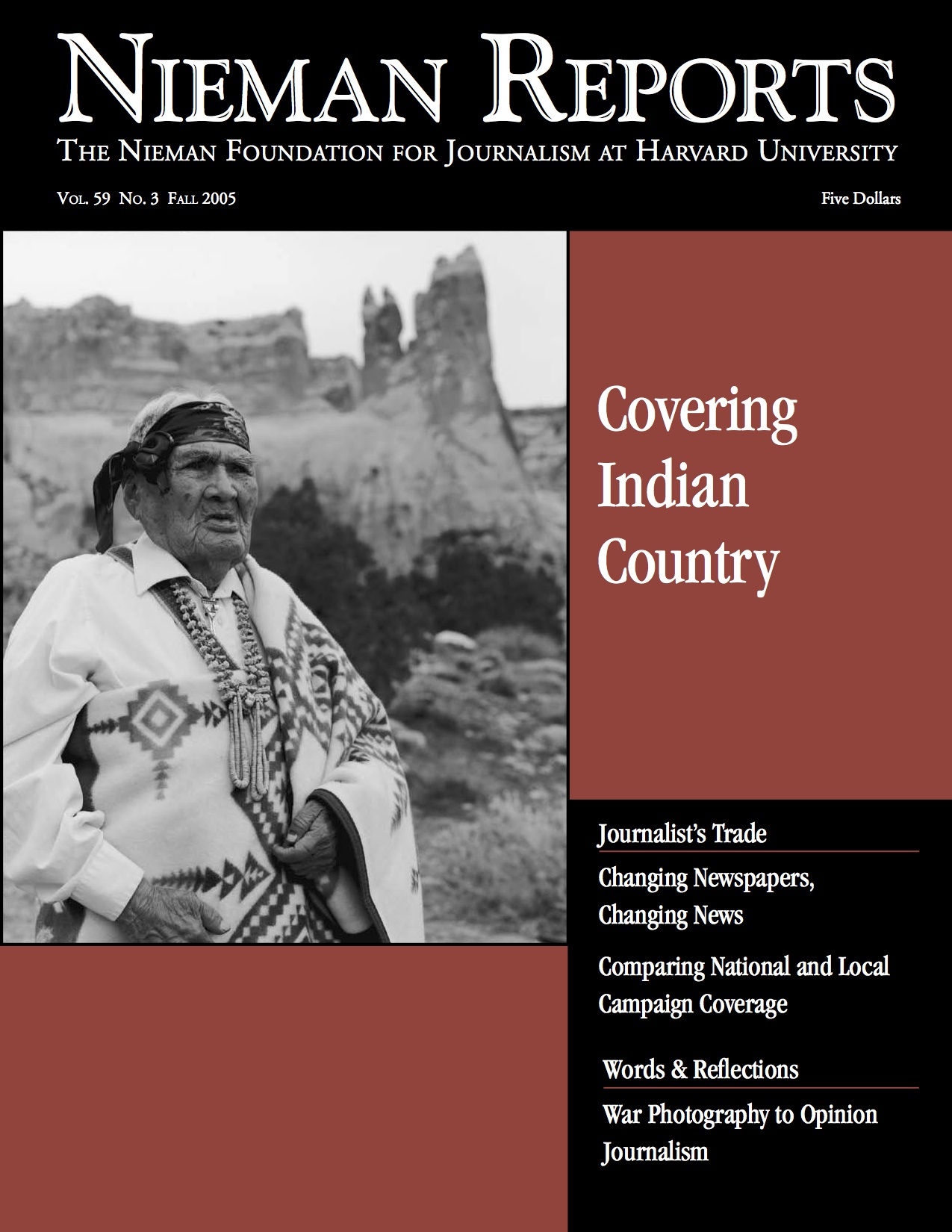In March, Nieman Foundation Curator Bob Giles welcomed to Lippmann House the participants in a symposium cohosted by The Media Center at The American Press Institute. Called “Whose News? Media, Technology and the Common Good,” this two-day event brought together people whose professional lives intersect with the changing environment in which news is being gathered and disseminated. Edited excerpts from his remarks follow.
One question we will address in this symposium is whether the traditions of journalism will survive. This is a question of critical interest to the Nieman Foundation because our educational purpose is directly linked to elevating the standards of journalism. It is hard not to be aware of the controversies and conflicts swirling around mainstream journalism. Just how timely this gathering is can be seen in recent stories that reflect on the state of journalism. Or what Bill Berkowitz of AlterNet refers to as “the sorry state of journalism these days.”
This month the Columbia Journalism Review devoted an editorial to the idea that “it’s time to reconnect the press and the public …. If journalism is seen as just another hungry special interest, the public will toss the good out with the bad. That may already be happening,” the editorial warned, as it cited a “plaintive letter” posted on Romenesko last month by David Cay Johnston of The New York Times: “Just what has gone wrong in American journalism? Fewer people pay attention. More of those who do … reject all or part of the news. There is hostility and suspicion that reporters and editors and producers detect …. What does it mean for our democracy that so many people ignore or disbelieve the people whose job it is to watchdog our government? What does it mean that trust seems to be under broad assault?”
A commentary on Barron’s Online focused on the crisis of confidence confronting the mainstream media, combined with a technological revolution and structural economic change. Has this created “what can only be described as a perfect storm, especially for newspapers and broadcast outlets?” the Barron’s article asked. “Print’s business model is imploding as younger readers turn toward free tabloids and electronic media to get news. It has become fashionable these days for many in the media to indulge in self-flagellation, hail the emergence of ‘citizen journalists,’ and applaud the death of dinosaurs who ‘don’t get it.’” The Barron’s commentary concluded on a supportive note for the mainstream media: “In a polarized country facing difficult challenges, the public needs our skills, experience and most of all our professionalism to give them the vital information they need to make good decisions about their lives and our nation’s future.”
A study released recently by the Knight Foundation reflected on what’s happening with the readers and viewers of tomorrow. It uncovered what has been described as “a shocking level of student ignorance about the First Amendment, particularly its free speech and free press guarantees.” More than one-third thinks the First Amendment gives too much free press protection, and most students don’t understand what free speech is.
A report from The McKinsey Quarterly questioned whether the answer to dwindling newspaper readership might be a move to the tabloid format. It noted that several important European broadsheets have been converted into tabs, and the format has proved popular, with rising circulation in the next year. But changing formats carries the big risk of influencing more churn because U.S. papers are heavily dependent on home-delivered circulation, and these readers are more resistant to change.
Lou Ureneck, a teacher of business and economics journalism at Boston University, writing a Nieman Reports review of “The Vanishing Newspaper,” a new book by Phil Meyer at the University of North Carolina, summed up the current business culture of many newspaper companies: “In a period of declining circulation and public trust, it is a commentary on our times that budgets have become the key point of contact between editors and publishers (or corporate CEO’s) …. The concept of increasing the investment in editorial quality, or even moderating the impulse to cut newsroom budgets, has become a battlefield. On one side: editors with a blind faith in the power of potent journalism to win readers and improve society. On the other side: business-oriented managers with an unbending commitment to controlling costs and hitting the numbers that reward investors.”
In her new book about broadcast news called “News Flash,” Bonnie Anderson, a former executive at CNN, wrote that “It’s all about money, a desperate attempt to hang on to the huge profits news had earned over the years. And that is far more important to the corporations than the people’s right to know, even more important than a healthy democracy.” In a review of Anderson’s book for Nieman Reports, Rebecca MacKinnon, a former CNN bureau chief, writes that “Anderson does not paint a pretty picture of American TV news. It is a world in which the obsessive focus on viewer ratings, the parent corporation’s quarterly earnings and stock prices, have caused news executives to lose sight—even lose interest—in the American public interest.” Or what the planners of this symposium are referring to as the “common good.”
On AlterNet, Berkowitz identifies John Stauber and Sheldon Rampton of the Center for Media and Democracy as taking on an ambitious task of “reinventing journalism”—a mission driven by their exposures of “how corporate shills and government spokespersons have manipulated the media and undermined democracy for more than a decade.”
In a dean’s note to the students and alumni at Columbia University’s Graduate School of Journalism, Nick Lemann observes that “These are tough times in journalism, not just ethically, but also economically, professionally and politically. There is an ever-increasing amount of material that flies the flag of journalism, but doesn’t qualify by our standards. All of us are concerned about the depth of our audiences’ loyalty to what we’d consider the best in journalism.”
An item by Eric Boehlert that was posted on Salon notes that “for the last four years the persistent storyline about the White House’s relationship with the press has focused on the administration’s discipline, denial of access, and ability to stay on message. But in the wake of revelations about the aggressive and unprecedented tactics employed by the White House, that relatively benign interpretation is being reexamined. Recent headlines about paid-off pundits, video press releases disguised as news telecasts, and the remarkable press access granted to a right-wing pseudojournalist working under a phony name, have led many observers to conclude that the White House is not simply aggressively managing the news, but is out to sabotage journalism from within, to undermine the integrity and reputation of the press corps.”
At a Harvard conference on blogging in January organized by the Berkman Center for Internet and Society at the Law School and the Shorenstein Center on the Press, Politics & Public Policy at the Kennedy School of Government, several take-away points were identified:
- There is room for both professional news organizations and citizens’ media, such as blogs.
- Blogging and journalism are different, though sometimes they intersect.
- Ethics and credibility are key, but there are no clear answers on how credibility is won, lost or retained.
- Many mainstream news organizations now see using some form of participatory citizens’ media as a way to build loyalty, trust and preserve credibility.
- Opening online news archives for free public access might make business sense and build audience loyalty.
Washington Post media critic Howard Kurtz recently observed that “millions of people with access to a wide audience are looking over the shoulders of journalists, or are practicing journalism themselves …. Many bloggers are careful and thought provoking, others partisan or mean-spirited. But they are here to stay, and by and large they provide a healthy check on those who once monopolized the news agenda.”
In an editorial last Sunday [February 26], the St. Petersburg Times found this to be a “healthy development … which bloggers, for all their excesses, have shown they have a role to play in holding mainstream journalists accountable …. Mainstream journalists have nothing to fear from bloggers if they remain true to fundamental standards of accuracy and fairness. They must remain cautious before passing along information from blogs or reacting to their charges, while continuing to learn from a form of mass media that is evolving before our eyes.”
Finally, Mike Getler, who is winding up his tour as The Washington Post’s ombudsman, writes that his perch has been “an interesting spot from which to watch all the angst unfold. The attacks on the mainstream media, and the attempts to undermine them, are indeed escalating. More and more e-mails have a nasty, threatening, ideological tone. The number of people who claim they are canceling their subscriptions because they don’t like the coverage of this or that is increasing.”
Getler continues: “The blogosphere is a wonderful thing, but it doesn’t seem so new to me because it does what readers have always done: read, write, analyze, complain, correct. It has always been true that if you make a mistake on even the most arcane matter in a newspaper, someone out there will catch it and let you know.”
The Web and the explosion of blogs have greatly expanded the public reservoir of knowledge and understanding in important ways by challenging the accuracy of reporting and adding analysis. Getler argues that newspapers are “central to an informed citizenry … their special role cannot be filled by competing media …. Nothing out there is going to supply you with the extraordinary daily content of the Post, The New York Times, Los Angeles Times, The Wall Street Journal, and other fine newspapers.”
As these many strains swirl around the mainstream media, it is our hope that as we consider this important landscape, we can hold a tight focus on the standards of our craft and our obligation to serve the common good.



